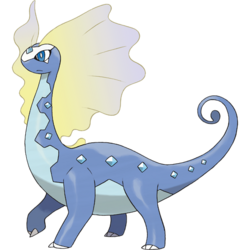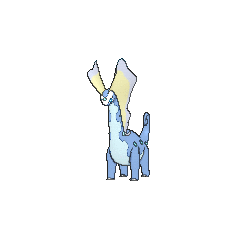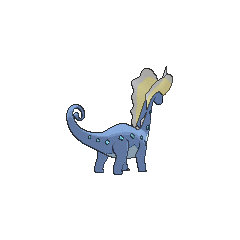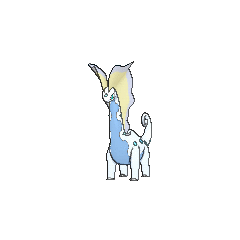From Bulbapedia, the community-driven Pokémon encyclopedia.
Aurorus (Japanese: アマルルガ Amaruruga) is a dual-type Rock/Ice Fossil Pokémon.
It evolves from Amaura when leveled up at night starting at level 39, after it is revived from a Sail Fossil.
Biology
Aurorus is a quadruped, dinosaurian Pokémon that is similar to sauropods. It is primarily blue with a lighter underside. There are two lines of small ice crystals running the length of its body, one line on each side. These crystals produce freezing air reaching temperatures of -240 degrees Fahrenheit. Aurorus uses this ability to create ice walls for protection.
A white, V-shaped mark covers the top of its head with another ice crystal in the center, giving it the appearance of wearing a tiara or a headress. Two large, flowing sails extend from the top of its head and run down its long neck. The sails are pale whitish-yellow at the base, and fade into a pale bluish-purple at the edges. There are three clawed toes on its hind legs, but one large nail and a single claw on its forelegs. The tip of its long, tapering tail is teardrop-shaped and curls inward.
In the anime
Major appearances
Aurorus made its debut in Coming Back into the Cold! alongside its pre-evolution, Amaura. Aurorus also appeared in the newspaper in To Find a Fairy Flower!.
Minor appearances
A fossil of an Aurorus appeared in Alola to New Adventure!, in the Pokémon School.
Pokédex entries
In the manga
In Shooting Frogadier, Grant owns an Aurorus. After several minor appearances, it was used in the attempt to stop the Ultimate weapon from activating.
In the TCG
- Main article: Aurorus (TCG)
Game data
Pokédex entries
| This Pokémon was unavailable prior to Generation VI.
|
| Generation VI
|
|
| X
|
The diamond-shaped crystals on its body expel air as cold as -240 degrees Fahrenheit, surrounding its enemies and encasing them in ice.
|
| Y
|
Using its diamond-shaped crystals, it can instantly create a wall of ice to block an opponent's attack.
|
| Omega Ruby
|
The diamond-shaped crystals on its body expel air as cold as -240 degrees Fahrenheit, surrounding its enemies and encasing them in ice.
|
| Alpha Sapphire
|
Using its diamond-shaped crystals, it can instantly create a wall of ice to block an opponent's attack.
|
|
|
Game locations
| This Pokémon was unavailable prior to Generation VI.
|
|
|
|
|
In side games
| This Pokémon was unavailable prior to Generation VI.
|
|
|
Stats
Base stats
| Stat
|
Range
|
| At Lv. 50
|
At Lv. 100
|
123
|
|
183 - 230
|
356 - 450
|
77
|
|
73 - 141
|
143 - 278
|
72
|
|
69 - 136
|
134 - 267
|
99
|
|
93 - 166
|
182 - 326
|
92
|
|
87 - 158
|
170 - 311
|
58
|
|
56 - 121
|
108 - 236
|
Total: 521
|
Other Pokémon with this total
|
- Minimum stats are calculated with 0 EVs, IVs of 0, and (if applicable) a hindering nature.
- Maximum stats are calculated with 252 EVs, IVs of 31, and (if applicable) a helpful nature.
|
Type effectiveness
| Under normal battle conditions in Generation IX, this Pokémon is:
|
|
|
|
|
|
|
|
|
|
|
|
|
Learnset
All damage-dealing Normal-type moves will get STAB if Aurorus has the Ability Refrigerate.
|
|
|
|
- Bold indicates a move that gets STAB when used by Aurorus
- Italic indicates a move that gets STAB only when used by an Evolution of Aurorus
|
|
|
|
|
- Bold indicates a move that gets STAB when used by Aurorus
- Italic indicates a move that gets STAB only when used by an Evolution of Aurorus
|
|
|
|
|
- Moves marked with an asterisk (*) must be chain bred onto Aurorus in Generation VII
- Moves marked with a double dagger (‡) can only be bred from a Pokémon who learned the move in an earlier generation.
- Moves marked with a superscript game abbreviation can only be bred onto Aurorus in that game.
- Bold indicates a move that gets STAB when used by Aurorus
- Italic indicates a move that gets STAB only when used by an Evolution of Aurorus
|
|
|
|
|
- A black or white abbreviation in a colored box indicates that Aurorus can be tutored the move in that game
- A colored abbreviation in a white box indicates that Aurorus cannot be tutored the move in that game
- Bold indicates a move that gets STAB when used by Aurorus
- Italic indicates a move that gets STAB only when used by an Evolution of Aurorus
|
|
|
|
|
- Bold indicates a move that gets STAB when used by Aurorus
- Italic indicates a move that gets STAB only when used by an Evolution of Aurorus
|
Side game data
Evolution
Sprites
| This Pokémon was unavailable prior to Generation VI.
|
|
|
Trivia
Origin
Aurorus is based on an Amargasaurus, which were speculated to have possible skin sail extensions on their vertebral spines. It also shares traits with various species of Diplodocoidea. The color-changing sails are also based on auroras, most likely aurora borealis due to its partial Ice typing, and the fact it only evolves at night, when the aurora borealis is most often seen. Similar to Tyrantrum, considering its white, V-shaped mark with an ice crystal covering the top of its head and two flowing extended sails running down its neck, it may have also been based upon a queen, with the mark and the two flowing sails acting as a tiara or a headress worn by queens from medieval times while its body with small ice crystals resembles a dress.
Name origin
Aurorus may be a combination of aurora and Amargasaurus.
Amaruruga is from Amargasaurus.
In other languages
| Language
|
Title
|
Meaning
|
 Japanese Japanese
|
アマルルガ Amaruruga
|
From Amargasaurus
|
 French French
|
Dragmara
|
From dragon and Amargasaurus
|
 Spanish Spanish
|
Aurorus
|
Same as English name
|
 German German
|
Amagarga
|
From Amargasaurus and possibly Gargas
|
 Italian Italian
|
Aurorus
|
Same as English name
|
 Korean Korean
|
아마루르가 Amarureuga
|
From its Japanese name
|
 Mandarin Chinese Mandarin Chinese
|
冰雪巨龍 Bīngxuějùlóng
|
From 冰雪 bīngxuě, 巨 jù, and 恐龍 kǒnglóng
|
 Cantonese Chinese Cantonese Chinese
|
冰雪巨龍 Bīngsyutgeuihlùhng
|
From 冰雪 bīngsyut, 巨 geuih, and 恐龍 húnglùhng
|
|
|
|
| More languages
|
 Hindi Hindi
|
औरोरस Aurorus
|
Transcription of English name
|
 Russian Russian
|
Аврорус Avrorus
|
Transcription of English name
|
|
|
|
Notes
External links

|
This Pokémon article is part of Project Pokédex, a Bulbapedia project that aims to write comprehensive articles on each Pokémon species, as well as Pokémon groups and forms.
|
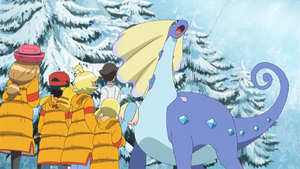
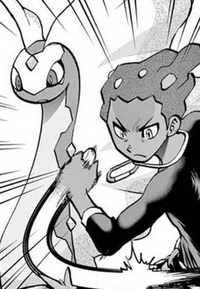
 For other sprites and images, please see Aurorus images on the Bulbagarden Archives.
For other sprites and images, please see Aurorus images on the Bulbagarden Archives.
